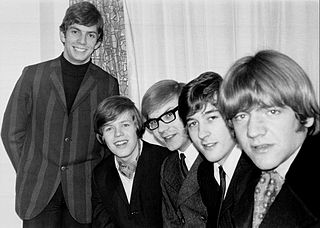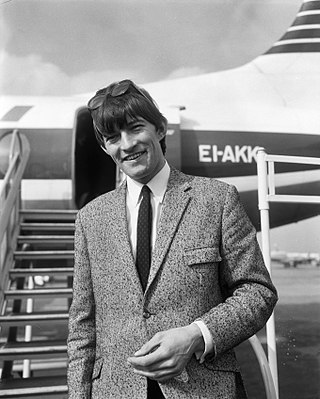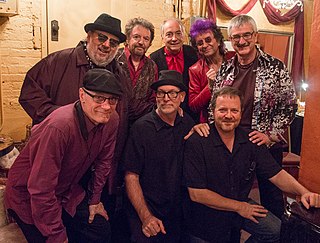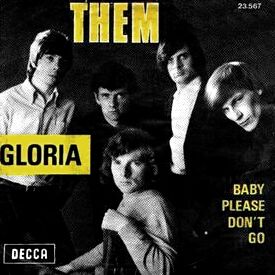Related Research Articles

Herman's Hermits are an English rock and pop group formed in 1963 in Manchester and fronted by singer Peter Noone. Known for their jaunty beat sound and Noone's often tongue-in-cheek vocal style, the Hermits charted with numerous transatlantic hits in the UK and in America, where they ranked as one of the most successful acts in the Beatles-led British Invasion. Between March and August 1965 in the United States, the group logged twenty-four consecutive weeks in the Top Ten of Billboard's Hot 100 with five singles, including the two number ones "Mrs. Brown You've Got a Lovely Daughter" and "I'm Henry VIII, I Am".

Madchester was a musical and cultural scene that developed in the English city of Manchester in the late 1980s, closely associated with the indie dance scene. Indie dance saw its artists merging indie rock with elements of acid house, psychedelia, and 1960s pop.
Clodagh Rodgers is a retired singer from Northern Ireland, best known for her hit singles including "Come Back and Shake Me", "Goodnight Midnight", and "Jack in the Box".

"Over the Rainbow", also known as "Somewhere Over the Rainbow", is a ballad by Harold Arlen with lyrics by Yip Harburg. It was written for the 1939 film The Wizard of Oz, in which it was sung by actress Judy Garland in her starring role as Dorothy Gale. It won the Academy Award for Best Original Song and became Garland's signature song.
The Tornados were an English instrumental rock group of the 1960s that acted as backing group for many of record producer Joe Meek's productions and also for singer Billy Fury. They enjoyed several chart hits in their own right, including the UK and US no. 1 "Telstar", the first US no. 1 single by a British group.

Dave Berry is an English rock singer and former teen idol during the 1960s. His best-remembered hits are "Memphis, Tennessee", "The Crying Game" (1964) and his 1965 hit "Little Things", a cover version of Bobby Goldsboro's Stateside top 40 success.

Marmalade are a Scottish pop rock band originating from the east end of Glasgow, originally formed in 1961 as The Gaylords, and then later billed as Dean Ford and the Gaylords, recording four singles for Columbia (EMI). In 1966 they changed the band's name to The Marmalade and were credited as such on all of their subsequent recorded releases with CBS Records and Decca Records until 1972. Their greatest chart success was between 1968 and 1972, placing ten songs on the UK Singles Chart, and many overseas territories, including international hits "Reflections of My Life", which reached No. 10 on the US Billboard Hot 100 Chart and No. 3 on the UK chart in January 1970, and "Ob-La-Di, Ob-La-Da", which topped the UK chart in January 1969, the group becoming the first-ever Scottish artist to top that chart.
Manchester's music scene produced successful bands in the 1960s including the Hollies, the Bee Gees and Herman's Hermits. After the punk rock era, Manchester produced popular bands including Joy Division, New Order, The Smiths and Simply Red. In the late 1980s, the ecstasy-fuelled dance club scene played a part in the rise of Madchester with bands like the Stone Roses, Inspiral Carpets and Happy Mondays. In the 1990s, Manchester saw the rise of Britpop bands, notably Oasis.
Delphic were an alternative dance band from Manchester, England. They are signed to Polydor but released their first single "Counterpoint", produced by Ewan Pearson, in April 2009 through R&S Records. The band started out as a trio – Richard "Rick" Boardman, Matt Cocksedge, and James Cook – after their previous group, Snowfight in the City Centre, disbanded. They are now a four-piece band, augmented by drummer Dan Hadley, incorrectly identified as "Dan Theman" on early news coverage such as Paul Lester's "New Band of the Day" feature.
The Scorpions are a 1960s British beat group, originally from Manchester in England, that became popular notably in the Netherlands. Their most important hit was "Hello Josephine", a song by Fats Domino.

The Ides of March is an American jazz rock band that had a major North American and minor UK hit with the song "Vehicle" in 1970. After going on hiatus in 1973, the band returned with their original line-up in 1990 and has been active since then.

Smokie are an English rock band from Bradford, Yorkshire. The band found success at home and abroad after teaming up with Mike Chapman and Nicky Chinn. They have had a number of lineup changes and were still actively touring in 2024. Their most popular hit single, "Living Next Door to Alice", peaked at No. 3 on the UK Singles Chart and, in March 1977, reached No. 25 on the Billboard Hot 100, as well as going to No. 1 on the Australian singles chart. Other hit singles include "If You Think You Know How to Love Me", "Oh Carol", "Lay Back in the Arms of Someone", and "I'll Meet You at Midnight".
The Four Pennies were an English beat group most notable for their 1964 UK chart-topping song "Juliet". The band achieved four more top 40 hits in the UK, but failed to chart in the United States during the British Invasion.

"Gloria" is a rock song written by Northern Irish singer-songwriter Van Morrison, and originally recorded by Morrison's band Them in 1964. It was released as the B-side of "Baby, Please Don't Go". The song became a garage rock staple and a part of many rock bands' repertoires.

Dave Formula, is an English keyboardist and film-soundtrack composer from Manchester, who played with the post-punk bands Magazine and Visage during the end of the 1970s and the beginning of the 1980s and in the "world music" band The Angel Brothers.

Bernard Bamford Calvert is an English musician who played bass guitar with The Hollies from 1966 until 1981.

"Black Is Black" is a song by the Spanish rock band Los Bravos, released in 1966 as the group's debut single for Decca Records. Produced by Ivor Raymonde, it reached number two in the UK, number four in the US, and number one in Canada. With the recording's success, Los Bravos became the first Spanish rock band to have an international hit single. A dance remix was released as a single in 1986.

Louis William Tomlinson is an English singer and songwriter. He rose to fame as a member of the boy band One Direction. Tomlinson auditioned on the British music competition series The X Factor in 2010. After being eliminated as a solo performer, he was placed into a group with four other contestants which went on to become one of the best-selling boy bands of all time.
Eliza Janet Thomson, who recorded as Barry St. John, was a Scottish female singer who had a No. 47 hit in the UK Singles Chart in December 1965 with "Come Away Melinda". It was her only solo chart success.

The Grehan Sisters were an Irish folk music act of the mid to late 1960s who achieved popularity in Britain after moving to Manchester, England in 1967 from their native Boyle in County Roscommon, via a spell performing in Dublin. They disbanded around 1970 but have occasionally reunited for one-off appearances in subsequent years, most recently in 2015, while Helen continues to perform intermittently as a solo artist.
References
- 1 2 3 4 5 Eder, Bruce. Biography of St. Louis Union at AllMusic . Retrieved 11 April 2009.
- 1 2 3 Colin Larkin, ed. (1997). The Virgin Encyclopedia of Sixties Music (First ed.). Virgin Books. p. 424. ISBN 0-7535-0149-X.
- ↑ Roberts, David (2006). British Hit Singles & Albums (19th ed.). London: Guinness World Records Limited. p. 479. ISBN 1-904994-10-5.
- ↑ "St Louis Union on Manchesterbeat - the group and music scene of Manchester in the 60's". Archived from the original on 5 September 2008. Retrieved 27 January 2009.
- ↑ "St Louis Union on Manchesterbeat - the group and music scene of Manchester in the 60's". 17 January 2009. Archived from the original on 17 January 2009. Retrieved 15 June 2021.
- ↑ "St Louis Union on Manchesterbeat - the group and music scene of Manchester in the 60's". Archived from the original on 5 September 2008. Retrieved 27 January 2009.